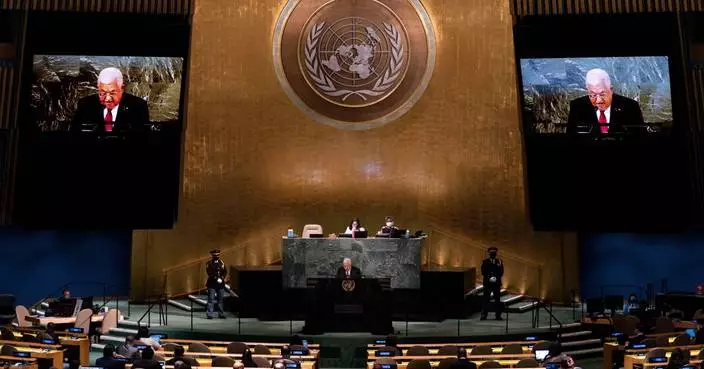The sole gunman in a Southern California synagogue shooting in which a woman was killed told an investigator he adopted his hatred of Judaism 18 months before the fatal attack, according to a federal search warrant.
John T. Earnest, 19, also told a San Diego Sheriff's detective that that he was inspired by Adolf Hitler and the suspected gunman in the New Zealand mosque shooting last March.
The search warrant, which as unsealed in a hate crimes case against Earnest, offered a few new details about the attack on the Chabad of Poway synagogue on the last day of the Jewish holiday of Passover, including when Earnest became drawn to anti-Semitism and hated of Islam.
San Diego police found a helmet with a video camera on it in Earnest's car when the San Diego man was arrested almost immediately after the April 27 shooting, which killed 60-year-old Lori Kaye and injured three others. He had an AR-15 rifle in the vehicle. It was previously known that Earnest said on the 8chan website that he planned to stream the attack live on Facebook. He never did.
"At that time, Earnest did not appear to be under the influence of a controlled substance but did appear to have a 'flat affect' as though he was detached or unaffected by his actions," the warrant states in recounting an interview that he gave to a San Diego police detective immediately after he was detained.
Earnest, an accomplished student and pianist, has pleaded not guilty to a 113-count federal indictment and faces charges of murder and attempted murder in state court, both of which may make him eligible for the death penalty if convicted. He also pleaded not guilty to state and federal charges of trying to burn a mosque in the nearby city of Escondido.
Those charges also include attempted arson at a mosque in nearby Escondido a month earlier.
A federal affidavit describes a deeply disturbed man filled with hatred toward Jews and Muslims, which is detailed in online writings. Earnest claimed to be inspired by the attacks on the mosques in New Zealand and a shooting at a Pittsburgh synagogue last fall.
Court documents said Earnest dialed 911 after fleeing the house of worship in his car and said: "I just shot up a synagogue." He went on to tell the dispatcher that he did it "because Jewish people are destroying the white race," according to the affidavit. He was arrested without a struggle.
WASHINGTON (AP) — The Biden administration said Friday that Israel's use of U.S.-provided weapons in Gaza likely violated international humanitarian law but that wartime conditions prevented U.S. officials from determining that for certain in specific airstrikes.
The finding of “reasonable” evidence to conclude that the U.S. ally had breached international law protecting civilians in the way it conducted its war against Hamas was the strongest statement that the Biden administration has yet made on the matter. It was released in a summary of a report being delivered to Congress on Friday.
But the caveat that the administration wasn't able to link specific U.S. weapons to individual attacks by Israeli forces in Gaza could give the administration leeway in any future decision on whether to restrict provisions of offensive weapons to Israel.
The first-of-its-kind assessment, which was compelled by President Joe Biden’s fellow Democrats in Congress, comes after seven months of airstrikes, ground fighting and aid restrictions that have claimed the lives of nearly 35,000 Palestinians, mostly women and children.
While U.S. officials were unable to gather all the information they needed on specific strikes, the report said that given Israel's “significant reliance” on U.S.-made weapons, it was “reasonable to assess” that they had been used by Israel's security forces in instances “inconsistent” with its obligations under international humanitarian law “or with best practices for mitigating civilian harm.”
Israel’s military has the experience, technology and know-how to minimize harm to civilians, but “the results on the ground, including high levels of civilian casualties, raise substantial questions as to whether the IDF is using them effectively in all cases,” the report said.
International human rights groups and a review by an unofficial panel of former State and military officials, academic experts and others had pointed to more than a dozen Israeli airstrikes for which they said there were credible evidence of violations of the laws of war and humanitarian law. Targets included aid convoys, medical workers, hospitals, journalists, schools and refugee centers and other sites that have broad protection under international law.
They argued that the civilian death toll in many strikes in Gaza — such as an Oct. 31 strike on an apartment building reported to have killed 106 civilians — was disproportionate to the value of any military target.
Israel says it is following all U.S. and international law, that it investigates allegations of abuse by its security forces and that its campaign in Gaza is proportional to the existential threat it says is posed by Hamas.
Rep. Michael McCaul, the Republican chairman of the House Foreign Affairs Committee, said the review “only contributes to politically motivated anti-Israel sentiment” and should never have been done.
“Now is the time to stand with our ally Israel and ensure they have the tools they need,” he said in a statement.
But Sen. Chris Van Hollen, the Maryland Democrat who led the push in Congress, told reporters that even even though the administration had reached a general finding, “they’re ducking a determination on the hard cases. Politically inconvenient cases.”
The U.S. “treats the government of Israel as above the law,” Amanda Klasing of the Amnesty International USA rights group said in a statement.
Biden has tried to walk an ever-finer line in his support of Prime Minister Benjamin Netanyahu’s war against Hamas. The U.S. leader is a target of growing rancor at home and abroad over the soaring Palestinian death toll and the onset of famine, caused in large part by Israeli restrictions on the movement of food and aid into Gaza. Tensions have been heightened further in recent weeks by Netanyahu’s pledge to expand the Israeli military’s offensive in the crowded southern city of Rafah, despite Biden's adamant opposition.
Biden, in the closing months of a tough reelection campaign against Donald Trump, faces demands from many Democrats that he cut the flow of offensive weapons to Israel and denunciation from Republicans who accuse him of wavering on support for Israel at its time of need.
The Democratic administration took one of the first steps toward conditioning military aid to Israel in recent days when it paused a shipment of 3,500 bombs out of concern over Israel’s threatened offensive on Rafah, a southern city crowded with more than a million Palestinians, a senior administration official said.
The presidential directive that led to the review, agreed to in February, obligated the Defense and State departments to conduct “an assessment of any credible reports or allegations that such defense articles and, as appropriate, defense services, have been used in a manner not consistent with international law, including international humanitarian law.”
Nothing in the presidential directive would have triggered any cutoff of arms if the administration had more definitively ruled that Israel’s conduct had violated international law.
The agreement also obligated the State and Defense departments to tell Congress whether they deemed that Israel has acted to “arbitrarily to deny, restrict, or otherwise impede, directly or indirectly,” delivery of any U.S.-supported humanitarian aid into Gaza for starving civilians there.
On this question, the report cited “deep concerns” that Israel played a significant role in preventing adequate aid from reaching starving Palestinians. However, it said Israel had recently taken some positive steps, although still inadequate, and the U.S. government did not currently find Israel restricting aid deliveries in a way that violated U.S. law governing foreign militaries that receive U.S. military aid.
Van Hollen accused the administration of glossing over what he said were clear Israeli blocks on food and aid deliveries during much of the war. “That’s why we have hundreds of thousands of Palestinians that have nothing to do with Hamas on the verge of starvation,” he said.
Lawmakers and others who advocated for the review said Biden and previous American leaders have followed a double standard when enforcing U.S. laws governing how foreign militaries use U.S. support, an accusation the Biden administration denies.
Their opponents argued that a U.S. finding against Israel would weaken it at a time it is battling Hamas and other Iran-backed groups. It's not clear how much Friday's more in-between verdict would add to pressure on Biden to curb the flow of weapons and money to Israel’s military or further heighten tensions with Netanyahu’s hard-right government.
At the time the White House agreed to the review, it was working to head off moves from Democratic lawmakers and independent Sen. Bernie Sanders of Vermont to start restricting shipments of weapons to Israel.
Israel launched its offensive after an Oct. 7 assault into Israel, led by Hamas, killed about 1,200 people. Two-thirds of the Palestinians killed since then have been women and children, according to local health officials. U.S. and U.N. officials say Israeli restrictions on food shipments since Oct. 7 have brought on full-fledged famine in northern Gaza.
Human rights groups long have accused Israeli security forces of committing abuses against Palestinians and have accused Israeli leaders of failing to hold those responsible to account. In January, in a case brought by South Africa, the top U.N. court ordered Israel to do all it could to prevent death, destruction and any acts of genocide in Gaza, but the panel stopped short of ordering an end to the military offensive.
Biden in December said “indiscriminate bombing” was costing Israel international backing. After Israeli forces targeted and killed seven aid workers from the World Central Kitchen in April, the Biden administration for the first time signaled it might cut military aid to Israel if it didn’t change its handling of the war and humanitarian aid.
Presidents Ronald Reagan and George H.W. Bush, in the 1980s and early 1990s, were the last presidents to openly hold back weapons or military financing to try to push Israel to change its actions in the region or toward Palestinians.
—-
Zeke Miller and Mike Balsamo contributed.

Palestinians mourn their relatives killed in the Israeli bombardment of the Gaza Strip, at a hospital in Rafah, Gaza, Friday, May 10, 2024. (AP Photo/Ismael Abu Dayyah)

U.S. President Joe Biden boards Marine One at Moffett Airfield in Mountain View, Calif., Thursday, May 9, 2024. (Jose Carlos Fajardo/Pool Photo via AP)











